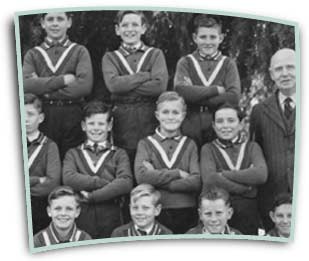
LL THAT I AM, I OWE TO THE LORD and to the church. This church—the Seventh-day Adventist Church—is not perfect, but it is a good church. God is working in our midst.
Kindly permit me to share with you three scenes from my journey, three out of the great many that I could select. They all hinge on the verse of Scripture that has become my favorite:
“But he said to me, ‘My grace is sufficient for you, for my power is made perfect in weakness’” (2 Cor. 12:9). Paul is talking about the thorn in his flesh—apparently a physical problem—and he pleads with God to take it away, whatever it was. And God says, “No, I won’t take it away, but My grace will be sufficient for you because My power is made perfect in weakness.”

Paul goes on to say: “Therefore I will boast all the more gladly about my weaknesses, so that Christ’s power may rest on me. . . . For when I am weak, then I am strong” (verses 9, 10). Conversely, when we think we are strong, we are actually weak.
Scene 1: Grace that empowers
I reach back many years, back into the 1950s. The scene is an army parade ground with 800 soldiers drilling before the commanding officer. They have been in camp for several weeks. This is Australia, and the Korean War is raging. All young men are conscripted into “national service” when they turn 18. They go through 98 days of boot camp.
The commanding officer looks over the parade and notices that one soldier does not carry a weapon. He calls over a junior officer and tells him to get the soldier off the parade ground.
I am that soldier. I am ordered to fall out and return to the barracks.
A couple of years earlier I had become a Christian and embraced the teachings of the Seventh-day Adventist Church. One of those teachings recommended a noncombatant response in times of war. The government made a provision for “conscientious objectors,” but it wasn’t easy or automatic. You had to go before a magistrate and be cross-examined by a state’s attorney. That’s what I went through.
I was a shy, bookish young man, in university studying chemistry. I look back, and find it extraordinary how the Lord empowered me to be the only soldier on that parade ground without a rifle. When Sabbath came around, another test. We had no leave for the first five or six weeks, and training was every day, with church parade on Sunday. I put in a request to have Sabbaths off. It went up the line to the commanding officer, who ordered me to appear in person. I explained why I did not want to take part in the exercises on the Sabbath, and he granted my request. So on Sabbaths the other soldiers went to their training, while I took my Bible and went into the woods. Sundays they lined up and went to church; I worked.
This text, 2 Corinthians 12:9, was true for me then, and it has been true for me over the years. Grace is all-sufficient; grace is made complete, made perfect in our human weakness.
Scene 2: Grace to say “Yes!”
Fast-forward a couple of years. I have earned a degree in chemical technology. I’m working in a lab doing research on the industrial application of some new resins that have been developed—“epoxies,” as we know them now. As I experiment with these resins, I am amazed at their properties. But the Lord is also working me over.

It’s a Friday afternoon, and I am standing washing my hands at a sink, cleaning up. The light shines through the window above the sink, and the Voice says: “What are you doing here?” No one else hears it. It is the Voice that we hear only within, in our soul. I knew at once what the Voice meant: It is time for you to leave this and do what I have been telling you to do, which is to go off and study to be a minister.
I had fought the Lord for several months. That afternoon I said, “Yes, Lord, I will do what You want me to do.”
Avondale College is about 900 miles away from my hometown of Adelaide, but it was the longest journey I’ve ever made. I was turning away from what I had trained and prepared for, starting over.
Noelene Taylor was also a student at Avondale. We met and fell in love. But her parents made it clear that we shouldn’t even think about marriage until I had proved myself in “the work” for a year or two. In our final year at Avondale, however, we received a call to go to southern Asia as missionaries. We had not applied for mission service, we weren’t yet married, yet we were called as a married couple! (That’s another story.) To me it was easy to say Yes to that call, to go to southern Asia. The tough decision had come three years earlier to go to Avondale College.
So we graduated from Avondale in November, married in December, and sailed three weeks later for India. We spent more than 15 years there; then the call to teach at the seminary at Andrews University. Then another call to connect with the Adventist Review.
God’s leading, God’s grace, God’s call. Grace that enables us to say yes when He says, “I want you to do this; I want you to go there; I want you to say this.” Grace all-sufficient to respond to His Word.
Scene 3: Overflowing grace
We’ll jump over many years to an exact date: February 18, 2004. I am sitting in the office of Pastor Jan Paulsen, president of the world church, and my boss. I have come to seek his counsel on a matter that seems big to me, but he quickly says, “Forget about that; it’s nothing much.” Then he goes on: “This is what I really want you to think about. Go back to your staff and try to figure out a way to get the
Adventist Review to many more people. To half a million, preferably a million people every month. Figure out how to do it and what it would cost.”
It’s something I had not expected, but something I could not refuse. What an opportunity, what a challenge! That began the big adventure of the last couple years, which resulted in the Adventist World.
Pastor Paulsen made it clear that there was no budget available to add staff. Furthermore, he could not guarantee that if we developed a plan the funds would be available to make it happen.
The Adventist Review staff responded magnificently to the challenge. We realized fairly soon that we would need to cover four areas: editorial, legal and financial, logistical (where and how to print), and distribution on a global basis.
We divided the staff into teams, focusing on each track. All this on top of our regular duties. We gathered a mass of diverse data and by Annual Council 2004 had the feasibility study complete. The council considered the proposal and gave us the green light.
At that point I expected that the General Conference would set up a working group to transpose the proposal from concept to reality. Instead Pastor Paulsen told us to carry the work through the final stage, designating undertreasurer Steve Rose as the General Conference officer who would advise us.
Over the next months we faced many decisions—some small, some very large. Over and over I would go to bed at night with unsolved problems in my head. I’d wake up early—sometimes very early—and think and pray. By the time I left for the office the solution would be clear. The Lord always came through.
The biggest question all along—maybe not the most important, but the biggest—was financial. Where would the funding come from? Steve Rose hoped that General Conference funds that have been confined in Korea, because of currency regulations, might be tapped. For many years efforts had been made to access this source, but to no avail. Steve Rose, attorney Tom Wetmore, and I went to Korea and met with the top tax attorney of the leading law firm of the country. He laid down very stringent requirements to satisfy the government regulations: it seemed impossible that these funds could be tapped. Then Elder P. D. Chun, formerly president of the Southern Asia-Pacific Division, came out of retirement, went to work, and through personal contacts with highly placed officials was able to secure the needed permissions. It didn’t cost the church one cent. We received the necessary exceptions to make the funds available to us.
I have greatly enjoyed my work as editor of the Adventist Review. One burden, however, has lain heavy on my heart throughout these years—the declining circulation. Despite all the marketing efforts, the number of subscribers has been slowly falling since 1963. For years I prayed that the Lord would give us 100,000 subscribers. Slowly, sadly, I had to adjust to the harsh realities.
Then, out of the blue, the Adventist World—and the first issue alone had a print run of 1.1 million!
The Lord is wonderfully good. When He says, “My grace is sufficient for all your needs,” it’s true. Grace overflows in every situation, beyond all that we can think or imagine. And whatever happens, now or in the days to come, His grace will be sufficient. No matter how weak we may feel, we can claim the promise: “My strength is made perfect in weakness.”
When I am weak, then I am strong.
___________________
William G. Johnsson is editor of the Adventist Review.

 Paul goes on to say: “Therefore I will boast all the more gladly about my weaknesses, so that Christ’s power may rest on me. . . . For when I am weak, then I am strong” (verses 9, 10). Conversely, when we think we are strong, we are actually weak.
Paul goes on to say: “Therefore I will boast all the more gladly about my weaknesses, so that Christ’s power may rest on me. . . . For when I am weak, then I am strong” (verses 9, 10). Conversely, when we think we are strong, we are actually weak. It’s a Friday afternoon, and I am standing washing my hands at a sink, cleaning up. The light shines through the window above the sink, and the Voice says: “What are you doing here?” No one else hears it. It is the Voice that we hear only within, in our soul. I knew at once what the Voice meant: It is time for you to leave this and do what I have been telling you to do, which is to go off and study to be a minister.
It’s a Friday afternoon, and I am standing washing my hands at a sink, cleaning up. The light shines through the window above the sink, and the Voice says: “What are you doing here?” No one else hears it. It is the Voice that we hear only within, in our soul. I knew at once what the Voice meant: It is time for you to leave this and do what I have been telling you to do, which is to go off and study to be a minister.